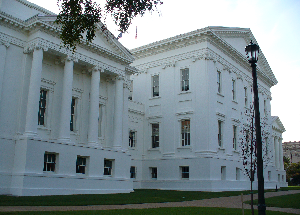Another reason people think an argument "without" evidence is always flawed is the incorrect assumption that it is impossible to "prove a negative." It is easily possible as explained here. Although the phrase "argument from ignorance" might be found in otherwise credible sources after the year 2000, it is not before. After about 2000 internet atheists made things like that up in order to "win" arguments they were obviously starting to lose.
When it is important to separate a speaker from other proponents of an argument it can be necessary to point out his flaws and note that they are only his, not others' who support the same cause. It isn't right to keep silent about his flaws and let others be assumed to have them also.
2 A tax which does not redistribute wealth between levels.
3 A tax which is for all people the same amount.
4 A tax system which does not restrain unfair practices per se, in itself.
The Town Voice Home
| This is the state capitol building of Virginia from the front (right photo) and the back (lower left photo). The central portion has been in use since 1788. The east and west wings were added in 1906. A major renovation was completed in 2007. |

|

| Since the renovation there are no air conditioners in the windows as the back view shows. Photos by Arlon Staywell. |